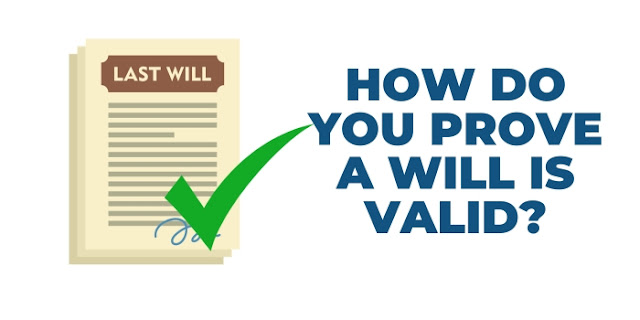How Do You Prove A Will Is Valid?
The passing of a loved one is undoubtedly a difficult time, and dealing with legal matters such as wills can add complexity to an already emotional situation. When a person creates a will, it's crucial to ensure its validity to honor their final wishes and distribute their assets accordingly. In this blog, we'll explore the essential steps to prove the validity of a will.
Consult an Attorney:
The first and most crucial step in proving a will's validity is to seek legal counsel. Hiring an experienced estate planning attorney will provide you with the expertise and guidance needed to navigate the process smoothly. They will help you understand the specific laws and requirements in your jurisdiction.
Locate the Original Will:
The original will is the primary document used to prove its validity. It should be in good condition and ideally signed by the testator (the person making the will) and witnessed according to local laws. If you cannot find the original will, consult your attorney for guidance on how to proceed with a copy or a lost will affidavit if applicable in your jurisdiction.
Gather Witnesses:
A valid will typically requires witnesses who can testify to the testator's state of mind and intent when creating the document. The number of witnesses and their qualifications may vary by jurisdiction, so consult your attorney for local requirements.
Verify the Testator's Capacity:
One crucial element of a valid will is the testator's mental capacity when creating it. They must be of sound mind, understanding the consequences of their decisions, and not under undue influence or coercion. Medical records, witness statements, and other evidence may be used to establish the testator's mental capacity.
Confirm the Will's Authenticity:
Ensuring that the will was not tampered with or forged is vital. To prove authenticity, forensic experts may examine the document for alterations, inconsistencies, or suspicious signatures. If there are concerns about the will's validity, your attorney can guide you through the process of contesting it in court.
Follow Legal Procedures:
Each jurisdiction has specific legal procedures for probating a will. This involves filing the will with the probate court, notifying beneficiaries and interested parties, and potentially settling any disputes. Your attorney will help you navigate these procedures correctly.
Witness Testimonies:
Witnesses play a crucial role in confirming the validity of a will. They may be required to provide statements or testify in court about the circumstances surrounding the will's creation and the testator's intentions.
Notarization and Self-Proving Affidavits:
In some jurisdictions, wills that are notarized or accompanied by self-proving affidavits, where witnesses confirm their signatures in front of a notary, may be considered valid without further testimony or evidence.
Time Limits:
Be aware of any time limits for filing a will for probate. Failing to do so within the prescribed time frame can result in the will being considered invalid.
Keep Detailed Records:
Throughout the process, maintain detailed records of all actions taken, correspondence, and communication with relevant parties. This will help ensure transparency and clarity, especially if the will is contested.
Conclusion
Proving the validity of a will is a critical step in the estate planning process. It requires careful adherence to legal procedures, the involvement of witnesses, and potentially consulting experts when necessary. An experienced estate planning attorney is your best ally in ensuring that your loved one's final wishes are honored and their assets distributed according to their intentions


%20(38).jpg)

Comments
Post a Comment